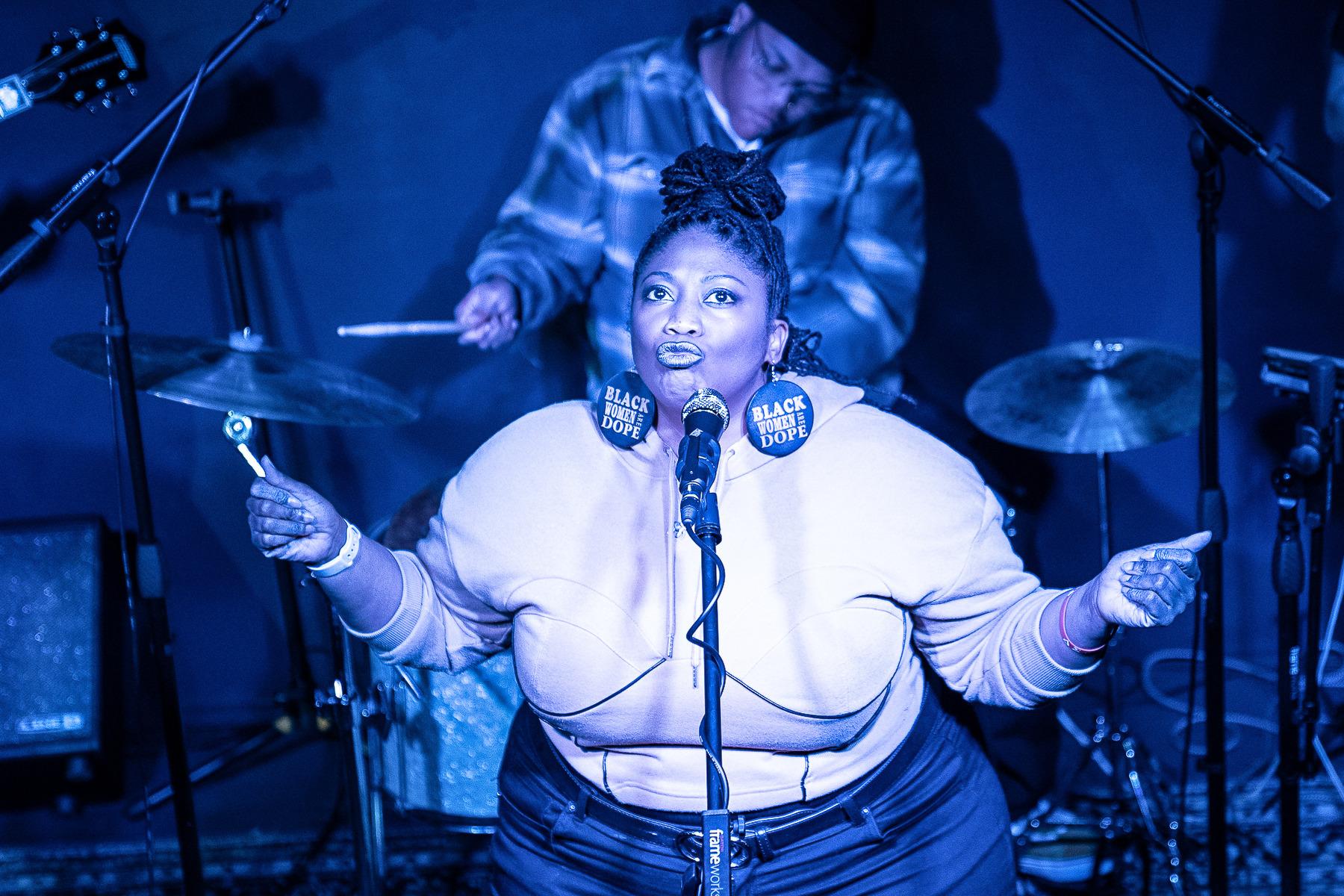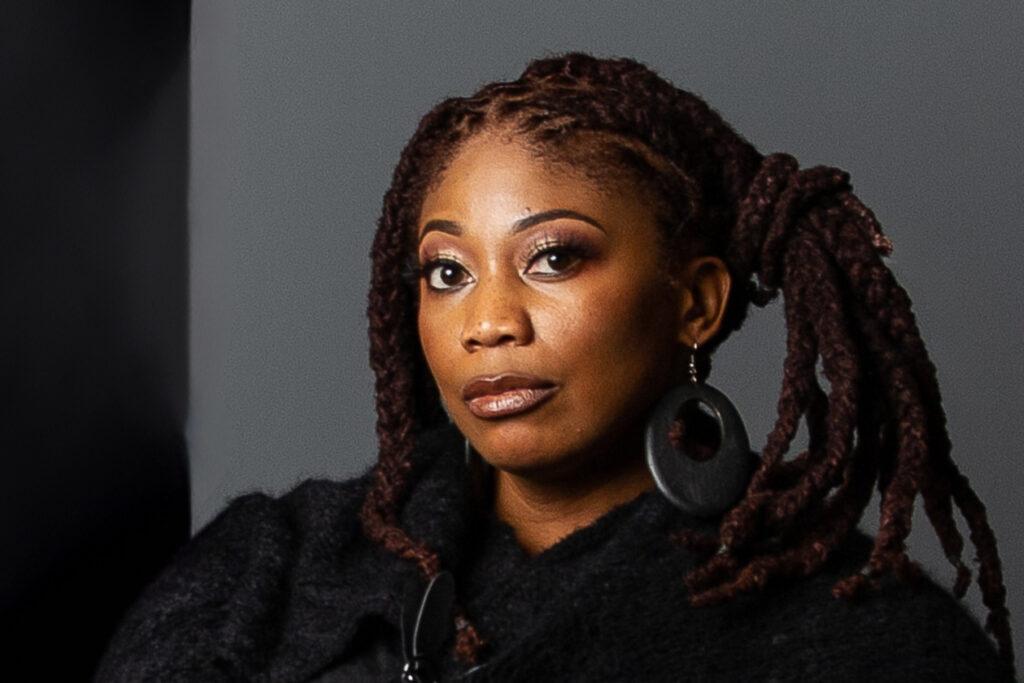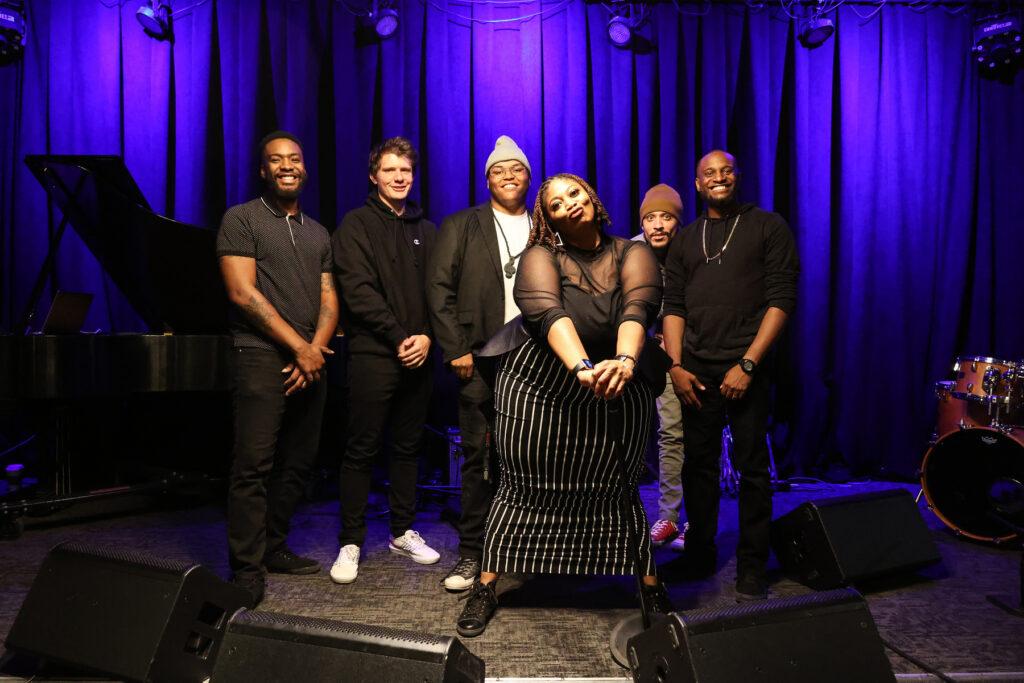
Editor's Note: This story contains details of self-harm. If you or someone you know is considering suicide or other acts of self-harm, please contact Colorado Crisis Services by calling 1-844-493-8255 or texting “TALK” to 38255 for free, confidential, and immediate support.
Joslyn Ford Keel sang her first solo at New Hope Baptist Church in Denver when she was two years old and delivered her first professional performance when she was five.
In many ways, she was following in the footsteps of her father, who performed at the Rossonian in Denver’s Five Points neighborhood when he was seven, and of her grandparents and a great-grandparent, who were also professional musicians.
Ford Keel has continued to perform for the last 37 years, including singing background vocals on three Grammy-nominated projects. But she’s only now getting ready to release her first album this spring. The first single, Butterflies Have Died, is out today.
“I just decided to take a chance on me, to start betting on me,” she said in an interview with CPR’s Colorado Matters.
Ford Keel, who uses the stage name JoFoKe, is also known locally for her residency at Dazzle in Denver, where she has a mission to share the stories of Black composers “that have gotten lost or aren’t shared,” she said. She was asked to do the residency in part because the club’s owner at the time, Don Rossa, noticed Ford Keel touched on topics from the stage that other performers didn’t address.
“‘I had no clue that there was such stigma in the Black community about getting treatment for mental illness,’” she recalls Rossa telling her. It’s a topic she wrote about in her single, “Count,” about counting everyday blessings.
“I feel that it is imperative that we have this dialogue, and in my eyes, there wasn’t a better candidate to speak from my own stage to my people than me,” she said. Ford Keel and her sister, Stacie Potts, have also set up a website to connect people who are struggling to find mental health services, particularly Black people looking for Black therapists.
Ford Keel talked with Colorado Matters host Chandra Thomas Whitfield about those topics and the value of the arts in society.
This interview transcript has been edited for length and clarity.

Chandra Thomas Whitfield: Congratulations to you on the release of this new music and the album you have coming up. Can you tell me more about your dad's family and their experience playing music here for three generations before you?
Joslyn Ford Keel: My grandmother, Mabel Maxwell Keel, was one of the first black Denver silent film pianists, and she went on to have a career in nursing. My dad’s father was also a musician; he was a trumpeter. He did some touring with Louis Armstrong. He was really good at that. But his passion for culinary arts won out.
Thomas Whitfield: Your dad’s trio, the Joe Keel Trio, was featured in a Rocky Mountain PBS documentary on jazz and Five Points. What has he told you about being a musician in Denver back then?
Ford Keel: He was so inspired by the people that surrounded him, the neighborhood that my generation refers to as the East Side or the E. He said that it was really common for everyone at that time to have some kind of musical talent; he just pursued it more heavily than his peers. For all of his siblings, it was a requirement that they couldn't go out and play until they swept, cleaned the kitchen, and practiced their instruments.
He played with the house Big Band at the Rossonian when he was seven, along with his big brother who was nine. They were told to come back in a few years because they were competent and able to play the notes on the sheet, but the conductor told them that they needed to get some life behind them.
Thomas Whitfield: In what ways do you think about this family legacy when you are writing songs or performing?
Ford Keel: I don't know that it is something that is right at the top of my consciousness, but it is ever-present. The legacy of not just music but musical excellence – the pursuit of besting oneself. That is something that I learned by watching their example. They didn't necessarily tell me, ‘You have to be the best,’ but they did tell me I needed to be the best that I could be.
Thomas Whitfield: How did you decide to go by the stage name JoFoKe?
Ford Keel: I am a proud alumna of Fisk University in Nashville, an HBCU, and I became a Jubilee Singer. One of my Jubilee big sisters was playing with my name. It also helped to kind of step out of the shadow of my family. I didn't always want to be known as Winston Ford's niece or Joe Keel's daughter or Jennifer Ford Keel's daughter. I wanted to be able to carve out my own path.
Thomas Whitfield: So there was a period of your life where you left Colorado. How did living in Nashville or just being outside of Colorado influence you?
Ford Keel: I think that everyone should leave their home. You get to know who you are and you get to craft who you want to be in life and artistically. Also, it is no secret that the Black population in Colorado is kind of small, at 4.7% of the population. Going to an HBCU in a more densely Black populated state and part of the country, there are things that are present, like cultural events, that we don't have an abundance of here.
That’s not to say that we don't have Black culture here in Denver, because we absolutely do. For me, growing up in the 80’s, a lot of my existence was in the Five Points area. I was surrounded by Black culture, but some of those things just aren't available now to this generation. That does kind of make me sad: some of the cultural opportunities, some of the community centers just aren't in existence anymore. Gentrification has really displaced the Black community at large.
Thomas Whitfield: Even before you started your Dazzle residency in 2021, I understand the club was an important place for you, right?
Ford Keel: Absolutely. I was protesting before the movement in 2020 — in 2014 and 2015 after the Mike Brown and Eric Garner incidents. I was quite heavily protesting, and a lot of the time, to sort of wind down after a protest or a meeting or something in activism, I would go to Dazzle and they had this open mic that would happen, or they would have young bands that would play, and so I would go in and sit in and sing.
Word got to Don Rossa, who at the time had no clue that he knew my people or that he knew my dad. And he was like, ‘I really enjoy you. You're extremely talented, but nobody is talking about the things that you're talking about from the stage. I had no clue that there was such a stigma in the Black community about mental health and getting treatment for mental illness.’
My voice trembles every time I do speak about my own struggles with attempted suicide and so on. But I feel that it is imperative that we have this dialogue. And in my eyes, there wasn't a better candidate to speak from my own stage to my people than me. I am one of them and we can't just pray this away and it's okay to say you're not okay.
Thomas Whitfield: You talk about this theme in your song “Count.” In that song, you talk about needing to count your joy almost like it's a reminder to yourself.
Ford Keel: It is. It actually was a journal entry that was prompted by a suicide attempt. My psychiatrist at the time in Nashville asked me to make a list of things that I felt were worth living for. At the top were my nephews who were toddlers. Fast forward some years, I found the journal entry and it just flowed out of me.
Thomas Whitfield: Has this song helped you connect with other people who are going through a similar journey trying to find those spaces of joy and maybe in some cases struggling to find spaces of joy in their life?
Ford Keel: It started almost immediately, where I would be approached by people in the audience. Sometimes there are receiving lines at the end of concerts, and they would wait until the end so we could be one-on-one to say, ‘I hear what you're saying and I need help,’ or ‘My family member needs help. Do you have any references?’
And it really started to pivot when I had a friend call me and say, ‘I'm in therapy, sis, but I don't think that this lady believes me when I tell her what I'm experiencing.’ He was talking really about just being a Black man. My sister, Stacie, and I got him connected to someone, and it ballooned from there, with other people making that request, then people reaching out with grant money, or saying, ‘We can take at least 20 Black children, women, and men.’ We have gift cards for Lyft or those kinds of things. And then people were volunteering to babysit to make time. It really just sort of became a movement. And that's how we started the Count Joy Network.
Thomas Whitfield: Could you say more about the mission of your residency at Dazzle?
Ford Keel: With this residency, I have been intentional about platforming other independent Black artists and Black music. We are intentional about sharing those stories of composers that have gotten lost or aren't shared, like the composer of The Wiz, which is the Black American interpretation of The Wizard of Oz. The composer of The Wiz was Charlie Smalls. When we first launched the residency, our closing tune was the Scarecrow’s anthem, ‘You Can't Win,’ which was made famous by Michael Jackson. We do our arrangement of ‘You Can't Win,’ and I’d tell Charlie Smalls’ story about being an 11-year-old prodigy and entering Julliard.
Shortly thereafter, he penned The Wiz, and it really is a story about being Black in America. All the costumes and everything color it nice and make it palatable. But if you just listen to the lyrics of that soundtrack from start to finish and don't necessarily think about scarecrows and lions and tigers and bears, you definitely hear the plight of Black America, which still rings true today.
Thomas Whitfield: You've been performing for so long and are just getting ready to put out your first whole album. Why is that?
Ford Keel: I love performing. I want to be on stage and I want to be able to exchange energies with the audience. That exchange is everything — the energy makes each performance different. Even if I were to do the exact same set list, each performance is different.
I also spent the majority of my twenties singing background for different artists and being more of a session vocalist than anything. Then I just decided to take a chance on me, to start betting on me. And so now we are JoFoKey and Same Cloth. So I feel like the time is right.

Thomas Whitfield: Now you're in your early forties. Where do you hope music takes you from here?
Ford Keel: In all honesty, I just want it to be able to pay my bills. I really want the appreciation of music to be as common as the appreciation for your accountant or any other profession in any other industry. And I really hope that is true for all of the arts. I hope it carries me to a place of comfortable retirement if I choose that.
I hope that people understand that an in-kind donation of skilled performance is not the move. I'm sorry, I can't take your fruit basket or a ticket to your event, or a plate at your banquet as payment. I hope that that is understood in Colorado and that it happens soon so that the mass exodus that has started doesn't continue — of artists leaving for better markets in California, Nashville, Atlanta, Chicago, New York, so on and so forth.
Thomas Whitfield: So you have seen an exodus of musicians in your orbit in Colorado leaving the state?
Ford Keel: It actually was something that used to be communicated to us young musicians: If you're going to do this, you need to go somewhere that is legit for music.
And now with technology being what it is, we don't necessarily have to go anywhere to get a deal or distribution. We do have some world-class studios here in Denver, but hopefully, Denver sees the value in the local artist and artistry, and then supports it, because people are going to do what they have to do to make a living.
So yes, several folks have left. There are some who have come back, but those who have come back are people like Diane Reeves, who is well-established. It's a sore spot that kind of touches me in a hurting place because Colorado is home and I would hate to have to leave for that. But you have to do what you have to do.
Thomas Whitfield: As you said, with your first album, you’re taking a chance on yourself!
Ford Keel: It's kind of like what Jay-Z said a few weeks ago on the Grammys: Just keep showing up. Keep showing up until they call you what you feel until they see what you think they should see. Until you are the chairperson or so on and so forth, or artist of the year, you show up until they see what you know about yourself.
Editor's Note: If you or someone you know is considering suicide or other acts of self-harm, please contact Colorado Crisis Services by calling 1-844-493-8255 or texting “TALK” to 38255 for free, confidential, and immediate support.









